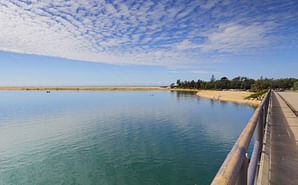About Biosecurity
Council has a legal obligation to manage the biosecurity risk by reducing the impacts of priority weeds.
Can't find your weed?
Use our Weed Identifier form to send us a photo so we can help you with controlling your weeds.
The Biosecurity Act 2015 and our shared responsibilities
The Biosecurity Act 2015 has been designed to align with biosecurity legislation across Australia. The broad objectives for biosecurity in NSW are to manage biosecurity risks from animal and plant pests and diseases, weeds and contaminants by:
- preventing their entry into NSW;
- quickly finding, containing and eradicating any new entries; and
- effectively minimising the impacts of those pests, diseases, weeds and contaminants that cannot be eradicated through robust management arrangements.
Council's responsibilities and obligations
Bega Valley Shire Council is a Local Control Authority under the Biosecurity Act 2015 and is responsible for administering the biosecurity risk from weeds in a shire that covers approximately 6200 square kilometers.
Under the Biosecurity Act 2015, Council has a legal obligation to manage the biosecurity risk posed or likely to be posed by reducing the impacts of Priority Weeds on human health, the economy, community and environment.
These obligations are met through programs conducted by Council staff and funded by Council and the NSW Department of Primary Industries to:
- control Priority Weeds on Council managed lands including almost 2500kms of high risk pathways and roads,
- inspect and control weeds on over 270 high risk sites,
- inspect private lands to ensure that owners of land carry out their obligations to manage the Biosecurity Risk as imposed under the Act by controlling Priority Weeds, and
- inspect public and crown land sites to ensure the owner carries out their obligation to manage the weed biosecurity risk by controlling priority weeds.
Council's Biosecurity Team is responsible for implementing these programs and takes a coordinated approach with residents, community groups and other agencies to control Priority Weeds on all lands in selected areas regardless of land tenure.
The aim of Council's biosecurity program is to:
- Raise awareness of the impact of weeds on biosecurity especially on agricultural lands, our bushland, foreshores and wetlands. This is achieved through communication between Council's Biosecurity Weed Officers and landholders, and through education about weeds and effective weed control techniques.
- Report new incursions and monitor and control where possible the spread of Priority Weeds and within the Shire.
- Protect biodiversity by controlling Priority Weeds.
Biosecurity Inspection, Reports and Processes
Property inspections are carried out after the owner/occupier of the land has been notified of the intention to do so. Inspections may be arranged verbally or in writing. It is preferred that the owner/occupier accompanies the inspector where possible. This creates opportunities for open discussion and questions that may need to be answered directly.
Following the inspection, the landholder is sent a report stating what, if any Biosecurity Matter (Weeds) are found on the property.
A reinspection will occur if the inspector is not convinced that an effective management plan is underway or will be implemented.
The inspection process in outlined in the Bioscurity Weed Inspection procedure, download a copy here.
As part of our ongoing commitment and responsibility to reduce the impact of weeds on our agricultural lands and the environment, Council will be undertaking property inspections in the following areas
During these inspections, Biosecurity Officers will be specifically looking for Lantana (Lantana camara), Ming asparagus fern (Asparagus macowanii), Boneseed (Chrysanthemoides monilifera subsp. monilifera) and Bitou bush (Chrysanthemoides monilifera subsp. rotundata). Information about these and other invasive weed species can be found on NSW WeedWise at https://weeds.dpi.nsw.gov.au/
Inspection program duration
Inspections will take place from Wolumla to Bega properties east of the Princes Highway from 3 March to 30 June 2025.

What is a Priority Weed?
Priority Weeds have the potential to pose a Biosecurity Risk which is required to be controlled by law; this is the responsibility of all landholders. These are known as Biosecurity Matter under the Biosecurity Act 2015 in NSW.
Priority Weeds or Biosecurity Matter can impact on human health, the economy, the liveability of our City and the environment. Impacts can include allergies and other health issues, costs of control, loss of tourism value, degradation of natural landscapes, parks and recreation facilities, reduction of useful agricultural land and loss of primary production, loss of biodiversity and water quality.
The South East Regional Strategic Weed Management Plan 2023-2025 outlines two categories of Priority Weeds;
- "State Priority Weeds"
- "Regional Priority Weeds"
Access the South East Regional Strategic Weed Management Plan (2023-2027)






